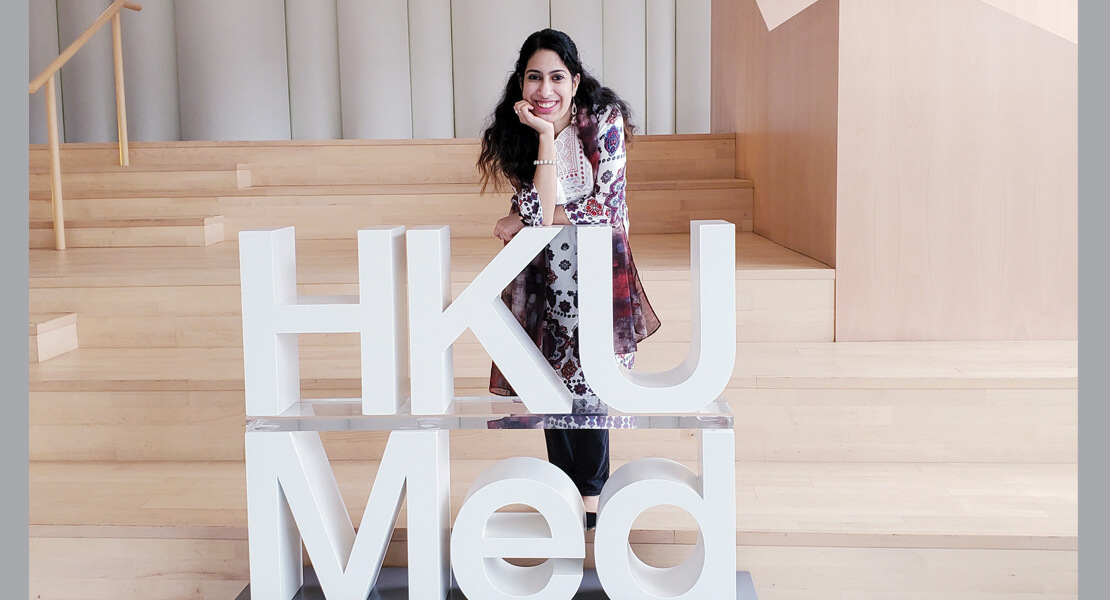Filling the Missing Piece in Healthcare for Ethnic Minorities
Miss Omme Kulsoom Akhtar | Year 4 Bachelor of Nursing (Full-time) student
I will enter my final year of nursing studies in September and I cannot believe time has flown this fast. It seems like just yesterday when studying HKU nursing was all I could dream of. During my secondary school years, I remember biology being my favourite subject. My teacher would explain about the cardiovascular and respiratory systems, and I would be completely mesmerised by it and intrigued about how the different body systems function in harmony. My other fondest memories from high school included my bringing relatives to hospitals whenever anyone got sick, all thanks to my ability to speak Cantonese, which helped me develop a likening for the hospital environment and medical professions. However, the defining moment that inspired me to pursue nursing was when I experienced first-hand the struggles of ethnic minorities.
I was in Form 5 when one night at 4am I heard my mom scream in pain from the bathroom. It was unclear what was causing the pain and I insisted we go to see the doctor to play safe; my parents however were very reluctant to do so and insisted that my mom just take a Panadol as they assumed it was simply a stomach ache. Despite my parents’ reluctance, I called the ambulance and took my mom to the accident and emergency (A&E) department where we later learned that she was suffering from a medical condition causing massive internal bleeding inside her abdomen which necessitated immediate surgery. The doctor was kind enough to explain the situation to me with the help of a drawing to facilitate decision making, as I was my mom’s only companion. The surgery was done in time and the bleeding was controlled, and everything after was uneventful.
However, that incident was a major eye-opener for me in terms of the health risks we run as ethnic minorities living in Hong Kong. From reluctance to see the doctor to not being able to communicate with health professionals, I could see just how many things could have gone wrong that day; the consequence in my mom’s case would quite literally have been “bleeding to death”. Had I been not there, my mom would not have gone to the hospital and even if she did, she spoke no Cantonese and only a little bit of English, which was not sufficient to communicate her symptoms. At 4am, the possibility of finding an interpreter was also low, not to mention that time was everything given it was an emergency. This experience allowed me to reflect on the importance of having ethnic minorities working as medical staff; they can better equip the medical field for catering to this community by breaking down the many barriers, from language to culture, that hinders treatment. I also learnt about the importance of health education for the ethnic minority community in tackling issues like reluctance to seek medical help and, as I have learnt over the past years, even sharing dangerous medications, which is not uncommon either.
Therefore, I hope to work as an A&E nurse some day and it is my goal to make the healthcare system more accessible and better equipped to solve issues faced by the ethnic minority community in Hong Kong. I remember when I had to facilitate communication between medical staff and my aunt, who spoke no Cantonese or English. The way I managed to help them was by writing down a list of symptoms, in both English and Urdu next to each other, which the doctor periodically needed to assess her for. The doctor could simply read the English and point to that and my aunt could understand by reading the Urdu word next to it. Urdu is the national language of Pakistan, so my rich language background allowed me to bridge the gap between the doctors and my aunt. In addition to bridging the language gap, I also aim to run health education and awareness programmes for ethnic minorities to tackle risky health behaviours stemming from lack of knowledge. Having had the experience of conducting health talks for medical students of another university and different health staff with the help of different organisations, I am confident that I am not so far away from my dream.
Back
